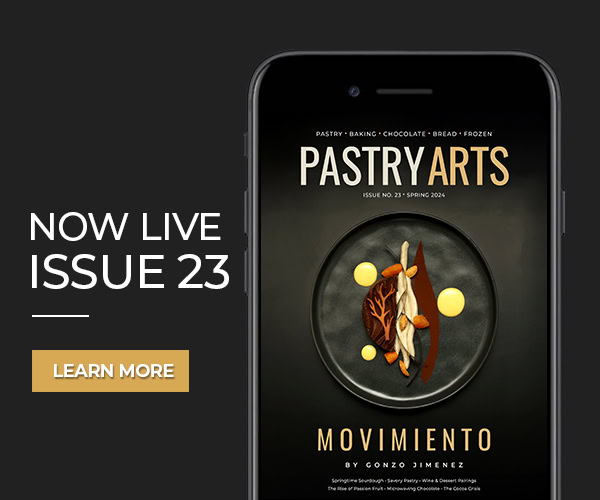By Shawn Wenner
In this exclusive interview with Pastry Arts Magazine, we delve into the world of Priscilla Scaff-Mariani, a renowned pastry chef whose culinary journey is as rich and varied as her creations. From her early inspirations rooted in family experiences in Brazil to her dynamic roles in prestigious establishments like The Modern, Balthazar, and Gabriel Kreuther, Priscilla shares her insights into the art of pastry making. Her philosophy intertwines a deep respect for tradition with a daring embrace of innovation, always guided by an unwavering commitment to quality and creativity. Join us as we explore Priscilla’s unique approach to pastry, her lessons learned along the way and her advice for the next generation of culinary artists, all while balancing the demanding rhythm of a professional kitchen with the harmonies of personal life.
Can you identify a pivotal moment in your pastry career?
I don’t think I’ve had a pivotal moment, per se. I think that after I left my first job after culinary school, I felt like I wanted to try every sector, every facet, of pastry that I could. So, after four years in a restaurant, I went to a bakery, then I went to fine dining, and then to commissary and retail space, spending at least three years in each place, so as to be fair to the learning that I felt was necessary. The places I chose were always very intentional, I picked places that had reputations of high learning and education and because I just wanted to learn everything I possibly could. So, I guess each place was pivotal. Each place taught me something new and necessary to understand the skills of the kitchen, soft skills and raw pastry methods.


What sparked your passion for a career in pastry?
I always remembered being in love with creating something and then serving it to others. It was a strong feeling that I have had within me for as long as I can remember. I have always been a creative type, always into art of some kind, and I loved the art of pastry and food was my medium. That creative outlet and expression went hand in hand with my love of service in a way. That led me straight into this career. And there was a defining moment when I was around nine-years old. I was visiting my great aunt in Brazil; we had picked apples in the garden one afternoon and then spent the day in the kitchen preparing a cake with those apples for dessert that night. [In] the act of picking the apples and preparing them with her and then enjoying them with others, it hit me, on that exact afternoon, that I wanted to do this forever.
Each place taught me something new and necessary to understand the skills of the kitchen, soft skills and raw pastry methods.
How have experiences at The Modern and Balthazar shaped your pastry-making philosophy?
Each place has taught me something that only that particular place could teach me, and at that specific time. I learned that it cannot be all about what I like to eat or not eat, that we are making pastry to please our guests, so we should be in tune to what it is that pleases many. Also, [I began to understand] that respect is paramount — respect for recipes, and how they are put together, respect for ingredients and using them at their optimal seasons and respect for those who produce and handle those ingredients.
What are your main responsibilities and key lessons learned at Gabriel Kreuther?
Some of my responsibilities are managing production for our restaurant’s pastry menu as well as our private dining menu, which are different menus. I am responsible for creating seasonal menus for both outlets as well, so recipe testing is a constant. Additionally, I get to manage the macaron production for Kreuther Handcrafted Chocolates as well as some seasonal products for the shop. I have learned so many lessons here, but one in particular is that I feel it is super important for me to write my thoughts and ideas out; actually writing them helps me to plan and organize. And I think that helps me execute things, communicate my ideas and my needs better. I think has been instrumental to the success of the team.


Respect is paramount — respect for recipes, and how they are put together, respect for ingredients and using them at their optimal seasons and respect for those who produce and handle those ingredients.
Could you describe your process for creating and introducing a new dessert?
Usually when thinking of a new dessert, I start with the season. I let the season and its offerings kind of guide me. Then I think of one of two things: “Do I want to convey a flavor or a memory?” If it’s a flavor, I think of the flavor in the peak of its season. I think of its complimentary flavors [and I ask], “what would go well with this flavor?” Usually I stick to three main flavors, and around two supporting flavors. Then I think of shapes and designs. I love to look at some old books to get inspired for design. Then once I get inspired for a design, I start to plug in textures. It takes around three to four plate ups to see if I like it or want to change things around, and sometimes to just let the idea go for a season and revisit another time. After the dessert is decided, I like to take around a week to build up an inventory of product and then it’s go time!
Writing them helps me to plan and organize. And I think that helps me execute things, communicate my ideas and my needs better
How does your focus on quality over quantity influence your creativity and kitchen operations?
I want to let the product speak for itself. I feel that sometimes the “quantity” can get very loud and distracting, so distracting you forget about the “quality.” So, I feel that if less is more, that you don’t have to necessarily put more things on a plate or overcomplicate a recipe or dish to make it better.
The same goes for daily operations: doing things the fastest doesn’t mean that things are being done the best way possible. I like to tell my team to work efficiently and make every move count. We want the quality of our work, be it spreading mousse evenly or scooping the quenelle, to be what matters more than the quantity.
How does respect play a role in your interactions, ingredient treatment, and professional approach?
I would say that respect is a cornerstone in life for me. Especially in my relationships with my team and colleagues, if there is no respect, there really can be nothing else. No respect to me means no trust, and no trust means no relationship. And without a relationship — to your team, to your product, to your craft — what are we even doing? There is a difference between “like” and respect, for me. I think that sometimes we might not “like” or “jive” with certain people or things or even places we are, but I always try to look at it from the perspective of respect; respect for the role, the ingredient, the craft, and the people involved in this profession. I also think that it connects closely to empathy for me, which makes me have respect for things and people as well.
What sets Valrhona’s chocolate apart, and why do their ethical practices resonate with you?
I think the thing that most distinguishes Valrhona products for me is their consistent quality. The quality of cacao flavor through their different expressions never seems to lack in luxury and mouth feel. But also, the hardest part of our job in the kitchen is to be consistent. The quality and a sort of level of perfection needs to be consistent. That, as well as their ethical standards of the cacao industry that leaves ample room to cut corners and do the wrong things to make the highest dollar. They have been transparent in their commitment to policies against child labor, protecting the forest and land on which the cacao fruits grow, as well as the farmers and laborers’ rights. It’s a big deal when a company puts that out there, because then they are forced to be held accountable, and I admire that immensely.
If less is more, you don’t have to necessarily put more things on a plate or overcomplicate a recipe or dish to make it better.
How do you balance tradition and innovation in your pastry creations?
I try to strike a balanced chord. I think traditional and classical flavors are incredible and therefore have stood the test of time, so I am very inspired by them. But I think it’s all up to interpretation, which is the fun part, because we all interpret things differently. Also, there are flavors I love that are likely not crowd pleasers, and vice versa so it’s a delicate balance that I try to capture.
Can you share your experience and feelings about winning the Cercle V Challenge Jury Prize?
It really meant so much to me to be recognized by highly talented industry professionals. And, truly, even to be considered to sit side by side with the other chefs from all over the world, is kind of a lot for me to digest. Sometimes you just have your head down and are doing your own thing in the place that you work, and you don’t really realize that your food can connect with others so far and wide. I think that’s what made it such an accomplishment for me. Plus, my mom and dad are still telling anyone that will listen about it, and that makes me chuckle too.


I always remembered being in love with creating something and then serving it to others
How does your team collaborate to create standout pastry dishes?
It’s always a collaboration in some way, always a bouncing of ideas [among] the team [members]. Up until recently it was very much a brainstorm of ideas between my mentor, Marc Aumont, and myself. Lately, my sous chef and I start with flavors we want to showcase, usually seasonal flavors. There are a lot of trials and tests, lots of tastings, until we feel it’s solid enough to put on the menu. The amazing part about working in NYC is the incredible melting pot of cultures that we have here. That doesn’t stop when it gets to our kitchen. Having our team share flavors from their respective cultures and sharing new flavor profiles is something I love to lean into when creating.
How do you balance work and personal life while pursuing pastry perfection?
Well, isn’t that the million-dollar question for every mother I’ve ever met! It is moments of rough waters and moments of calmer water. I try to do my best. I know that sounds so cliché, but I just do the very best that I can. And I am learning to know that sometimes I will be giving a lot to pastry and my craft, and sometimes I will be giving more to my family and my daughters. I must give myself some grace too, and that might be the hardest part. But I think relentless is a good word, I am not a lot of things, but I will say that I am relentless. Which means I usually get it wrong at first, and that’s okay with me, just as long as I keep at it. Also, I love to write things down, so if I have quiet moments to myself, I write so I won’t forget, whether I am thinking about pastry or birthday parties.
What advice would you give to budding pastry chefs about developing their style and ethos?
I would say, worry less about etching your name in being “somebody” or being “the pastry chef” and focus on learning. Focus on knowing the tricks, know the “why” to things. Once you understand why things happen in recipes, you can then begin to invent and create, and I think style begins there. That etching your signature or even finding your style does not happen in two years, or five years – shoot I’m still learning my style. There is no fast track to deeply understanding a craft. You will be able to perform and probably work and create just fine, but to truly be well rounded the foundation must be solid.
How do you stay updated with pastry trends and decide which to incorporate into your work? I think that the internet helps to keep me up to date on trends, but trends are hard to keep up with by nature. First and foremost, it has to taste good. If it doesn’t taste good, I am not interested in how cool it is, but will always be curious
to see what’s out there and what others are doing. But in order [for me] to incorporate new ideas, it has to be sustainable in our setting at the restaurant and we need to be able to execute consistently on a daily basis to call it a successful pastry or dessert.
How do you align your pastry creations with sustainability and ethical sourcing principles?
I think knowledge is power here, and once you know better, you should always strive to do better, for all. Sustainability and ethical sourcing are [things] I consider very important, and I feel that it is now very much part of our responsibility to look deeper into this when considering product. I do my best to use products and purveyors who respect each link of this food chain.
Photos by Todd Coleman
(This article appeared in the Winter 2024 issue of Pastry Arts Magazine)










You must be logged in to post a comment.